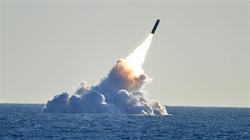 The Pentagon confirmed this week that it has, for the first time, armed some of its submarines with long-range nuclear missiles which have a lower destructive power compared with existing warheads. These so-called “mini-nukes” represent – despite the diminutive-sounding name – an increased risk of nuclear war.
The Pentagon confirmed this week that it has, for the first time, armed some of its submarines with long-range nuclear missiles which have a lower destructive power compared with existing warheads. These so-called “mini-nukes” represent – despite the diminutive-sounding name – an increased risk of nuclear war. RNA - The newly deployed W76-2 warhead fitted to the Trident missile system is reported to have an explosive yield of five kilotons, or about 1 per cent of the existing W76-1 weapon. The supposed lower-yield weapon is nevertheless an instrument of immense mass destruction, equivalent to approximately a third of the power of the bomb the US dropped on Hiroshima in August 1945 which killed tens of thousands of people. That puts in perspective the seemingly more usable “mini-nuke” missile.
However, with Dr Strangelove-type logic, Pentagon official John Rood, claimed the new device “would make Americans safer because it would deter the danger of nuclear war happening.” He also reportedly cited the weapon as a deterrent against alleged Russian aggression. (It is lamentable, if not absurd, how American officials incorrigibly portray Russia as a bogeyman. When will they ever evolve?)
The official US reassurance is not the view of the US-based Bulletin of Atomic Scientists who said the deployment of such weapons actually increases the risk of an eventual nuclear war. This is because the lower-yield W76-2 launched from US Ohio-class submarines will be indistinguishable from the existing Trident warheads. Therefore the danger of escalation to all-out nuclear war is increased.
Russia also condemned the US move. Sergei Ryabkov, Deputy Foreign Minister, said: “The US is actually lowering the nuclear threshold and conceding the possibility of waging a limited nuclear war and winning this war… this is extremely alarming.”
What is doubly perplexing is the wider context in which the Trump administration has abnegated arms controls treaties. Last year, the administration walked away from the Intermediate-range Nuclear Forces (INF) treaty, governing the use of short-range, or tactical, nuclear missiles. So far, Washington has shown every indication that it has no intention to extend the New START accord with Russia governing long-range strategic weapons, which is due to expire next year.
The deployment of low-yield nuclear weapons as part of the strategic arsenal is bound to destabilize the global strategic balance. Moscow has repeatedly warned that Washington is trying to incite a new arms race. It points to the undoing of arms controls treaties and the US weaponization of outer-space as evidence of such an agenda of provoking global insecurity.
It is tempting to speculate that the US is reacting to Russia’s development of hypersonic non-nuclear weapons which are said to be able to evade any anti-missile defense system. Moscow maintains that its arsenal is predicated on a doctrine of self-defense and not a first-strike objective. In any case, it seems that the US having realized that it has lost out to Russia in development of hypersonic non-nuclear weapons has taken the tack of expanding its nuclear options. That move overturns decades of declared non-proliferation commitments.
It should also be noted that this week the Kremlin disclosed that an urgent call issued by Russian President Vladimir Putin for the five permanent members of the UN Security Council to convene a summit in order to address international peace has so far been ignored by Washington. Last month, at a Holocaust memorial in Israel, Putin repeated a proposal for the UN founding powers – the US, Britain, France, Russia and China – to consolidate efforts for strengthening global security, non-proliferation and arms controls. This week, the Kremlin said this call has not received any response from the US (or the UK) to participate in such a forum.
Furthermore, next month sees one of the biggest-ever NATO war maneuvers in Europe, including a massive trans-Atlantic deployment of US forces. Russia’s Ministry of Defense has deprecated the huge mobilization as being akin to a rehearsal for an invasion of Russia.
President Donald Trump has previously stated his abhorrence of nuclear war and has called for negotiation of a new comprehensive arms control treaty between the US, Russia and China.
All empirical evidence shows that American rhetoric is completely and contemptibly detached from the reality of its threatening practices. The world is moving towards more insecurity and risk of catastrophic war. And the fault of that damnable dynamic lies entirely with Washington.
Source: Strategic Culture Foundation
847/940